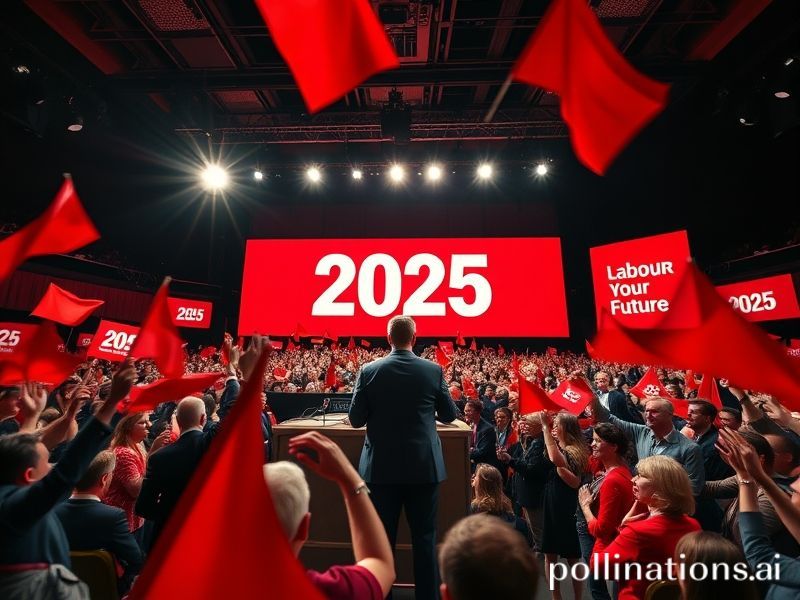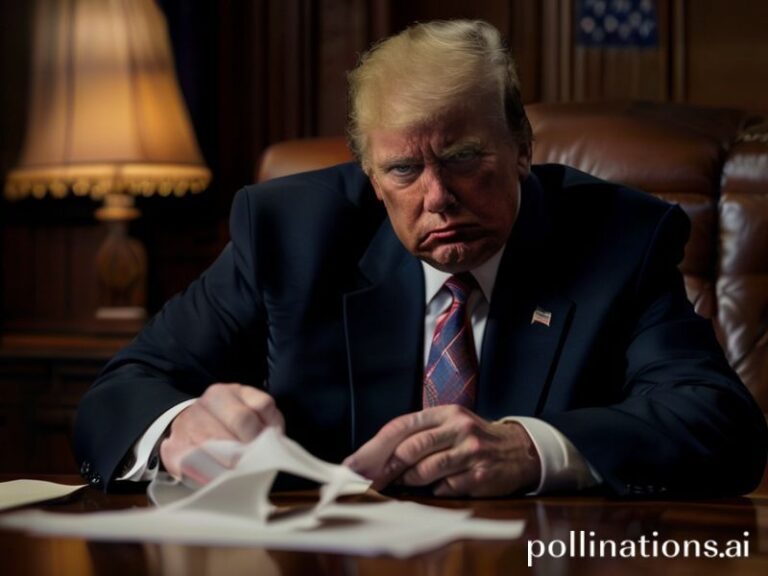Labour 2025: Britain’s Bid to Rejoin the Adults’ Table, One Recycled Tote Bag at a Time
Labour Party Conference 2025: When Britannia Tries to Rule Its Own Waves Again
By Davinia “Dave” Lockhart, International Correspondent, somewhere over the North Sea
Liverpool, 28 September 2025 – The Beatles once asked to be shown the way to get back to the USSR; this week Labour delegates merely wanted directions to the nearest functioning espresso machine inside the ACC Liverpool. The coffee, like the party platform, was officially “world-beating” but tasted suspiciously imported from a warehouse in Shenzhen. Still, caffeine is caffeine, and the 2025 Labour Party Conference unfolded beneath a giant LED banner promising “Global Britain, Fairer Planet” – a slogan that managed to be both cosmopolitan and parochial, like a vegan Cornish pasty.
From the outside looking in (a vantage point this correspondent recommends, preferably from a safe distance across the Channel), the conference felt less like a political rally and more like an international trade expo where the only product on offer was cautious optimism, bulk-discounted. Delegates from Sierra Leone, South Korea and Sweden’s Social Democrats mingled awkwardly with Merseyside councillors, all politely pretending that the UK’s post-Brexit charm offensive still had ammunition.
Global Context, or, How to Sell Austerity with a Smile
Keir Starmer took the stage flanked by EU Commission President Teresa Ribera and Canada’s freshly re-elected Prime Minister Mark Carney – a tableau designed to reassure investors that Britain had friends who don’t automatically demand payment in roubles. The trio unveiled the “Atlantic Sustainability Compact”: a carbon-border-adjustment scheme so labyrinthine that even the WTO needed a lie-down. In essence, the UK promised to decarbonise faster than a Tory MP deletes WhatsApps, while Europe and North America agreed to buy British green tech so long as it’s cheaper than the Chinese stuff. Somewhere in Beijing, an official laughed into his jasmine tea.
Meanwhile, the Global South watched with the weary amusement of a bouncer at an exclusive club that once ejected them. Kenya’s trade minister, munching conference shortbread, noted that Labour’s new “Just Transition Fund” earmarked £3 billion for African renewables – roughly the amount Britain spends annually on artisanal dog yoga. “It’s progress,” she shrugged, “from zero to symbolic is still a vector.”
The Domestic Comedy Hour
Back inside the hall, shadow chancellor Rachel Reeves preached fiscal rectitude while her autocue scrolled past a graph shaped suspiciously like a limp handshake. She vowed no return to “unfunded spending” – code for “we’re terrified of the bond vigilantes.” Markets responded by yawning so hard the FTSE had to check its pulse. In a side room, union barons compared the national minimum wage proposal to a participation trophy: “It’s nice, but the rent’s still due.”
The Palestinians got a standing ovation, the Ukrainians got another weapons wish-list, and the Taiwanese delegation got a polite note asking them to keep the semiconductor chat PG-13. Everyone left with branded tote bags made from recycled fishing nets, a gesture both eco-friendly and faintly redolent of cod desperation.
Broader Significance, or, Why This Matters Beyond Rain-Soaked Britain
Look, Labour 2025 isn’t going to realign the planets. But it does mark the moment the UK stopped pretending it could go it alone and remembered that multilateralism is like a marriage: tedious, occasionally abusive, but cheaper than divorce. The conference’s real product was narrative – a story Britain is selling to itself first, the world second. The plot: once-imperial island learns to pool sovereignty like a normal country, swaps gunboat diplomacy for offshore wind turbines, and discovers that influence today is measured less in aircraft carriers (one of which is still leaking) and more in regulatory standards.
International implications? Expect the EU to pocket Britain’s green commitments and demand parity on labour rights. Expect Washington to smile, nod, and quietly poach UK tech talent. Expect Beijing to undercut everyone on price and then invite Starmer to cut the ribbon on a battery plant in Sunderland – the geopolitical equivalent of letting the ex crash on your sofa.
Conclusion
As the conference wound down and delegates queued for the Merseyrail back to existential reality, the mood was cautiously triumphant – the way people cheer when the pilot lands in a cross-wind: relieved, but aware the next flight could be bumpier. Labour leaves Liverpool having promised to make Britain a “responsible stakeholder” again. The world’s response, translated from diplo-speak: “Fine, but we’ll be checking the receipts.” And somewhere, in a Davos bar, Boris Johnson is buying a round with crypto and telling anyone who’ll listen that he invented the term “Global Britain” first. Some things, mercifully, never change.







